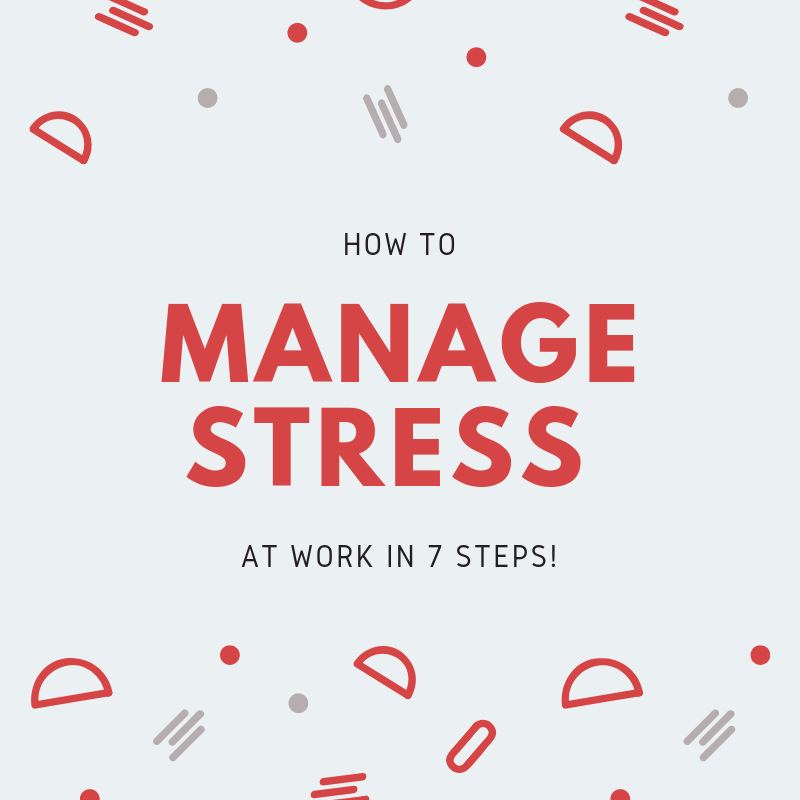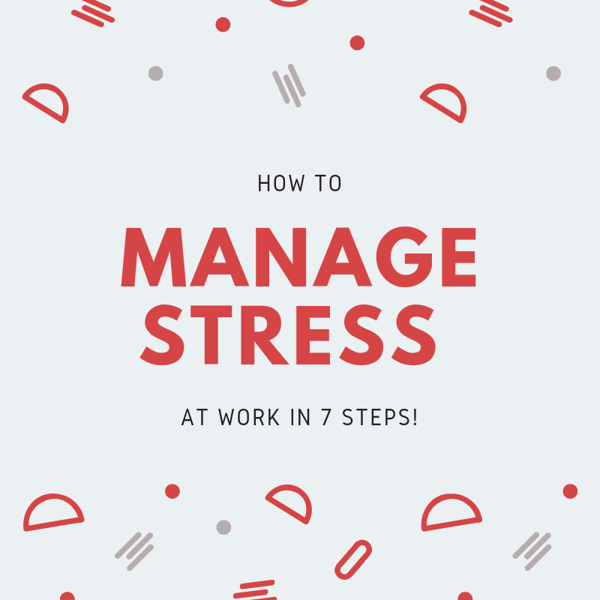
How to Manage Stress at Work in 7 Steps
Are you grumpy right now? Maybe you are annoyed or anxious or just tired! All of these feelings could be triggered by workplace stress. According to the CDC's National Institute of Occupational Safety and Health, recent studies have found the number of Americans who are "extremely stressed at work" ranges between 29% and 40%. We have a pretty good guess that the answer to at least one of those questions is yes!

Workplace-based stress has severe consequences for your physical and mental health. Here is the bad news, there is no way to alleviate workplace stress; the good news is there are lots of tips and tricks to decrease it. Here are some tips to help!
1. Identify Stressors
Identifying what stresses you out is the first step towards adjusting your habits. For a few days (or a week), keep a list of what stresses you out and identify what you do about that stress. Make a note of the setting, time of day, people included, and how you reacted. A few things to keep an eye out for are your reactions to the situation itself; Did you jump on Facebook? Go for a walk around the office? Grab a snack? Keeping notes will help you identify patterns in your behavior.
2. Develop Better Reactions
Now that you have identified your patterns, it is time to address your responses to stress. Instead of reaching for a soda or snacking on candy, take a break from your desk, clear your head with a walk. Try to avoid stress reducers that are secretly stressors themselves like social media or caffeine. If you don't have time for a walk, try taking a mental break and doing something you enjoy, like looking at vacation ideas. Be sure to give yourself a set time for your mental break (by setting a timer) so that you don't end up sucked into an internet black hole of cat videos.
3. Create Boundaries
Setting boundaries at work can be very hard, especially if you are bad at saying "no." Be realistic with your time and keep a tight calendar. When another employee asks for something, do not immediately say yes and start working on it (unless it is your true priority or direct request from your boss). Instead, take a moment to look at your calendar and plan for the day to see when you can fit in their request and notify them of when they can expect it to be completed. Be sure that you build time in your schedule for little things that pop up. We recommend setting aside the last hour of the day to run through and complete all the small tasks others need from you (plus it will make you feel productive).
4. Take Breaks
While we all want to put in a solid and productive 8 hours of work each day, it is essential to be realistic with your time. Take time throughout your day to recharge your brain. Plan in time to not be "working" at work. This can be as simple as going out to grab lunch with co-workers, taking a meeting off-site for coffee, or having a snack break where you don't look at email. Again remember to plan how long you plan on not working so that you do not get distracted and waste time (which causes more stress).
5. Talk to your boss
If for some reason you can not reduce your stress level, try talking to your boss. They might be able to assist with managing your workload or redistribute tasks to other individuals. It is important to remember that this should not be seen as a failure on your part but rather you identifying that you need help to succeed.
6. Get Help
Quit trying to do everything yourself. Take some time (we recommend when others are not around) to identify what tasks you can delegate to others. This can be both projects based or daily items you need to accomplish. By delegating and giving clear timelines, you reduce the amount of "to-do's" from your list there for lowering your stress level.
7. Reduce out of office stress
Sometimes work, and regular life can bleed together or carry over. It is vital to reduce your home life stressors so that you don't bring that stress into the workplace. We recommend doing these things to reduce general stress:
- Have a workout regiment (once a week can some times be enough)
- Get enough sleep
- Eat healthy as often as you can (pro tip skip McDonald's and grab a rotisserie chicken from the grocery store)
- Kick bad habits like checking email before you go to bed and keep a routine
- Delegate or share time-related tasks such as carpooling to pick up kids, or planning out your errands more efficiently.
- Wake up a few minutes early to plan each day (or make a plan the night before).
The most productive employees are stress-free employees. If you are looking to step up your game at work, it might be as simple as reducing your stress.


